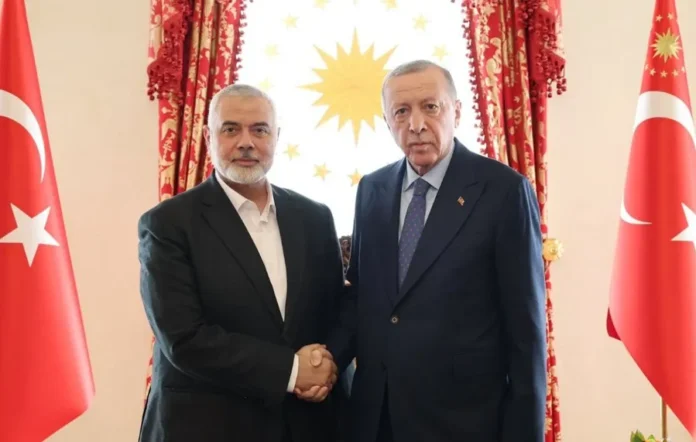M. Ahmet Karabay
After the assassination of Ismail Haniyeh, the head of Hamas’s Political Bureau in Palestine, the expected debate has come to the fore. The size of the wealth allegedly owned by Haniyeh has been a topic of interest for years. It is rumored that his sons came to Turkey after their father’s death and requested their father’s assets in Turkey from President Tayyip Erdoğan, but were told, “It’s not the right time!”
Ismail Haniyeh began to gain attention during his tenure as the chief of staff for Hamas’s Secretary General Sheikh Ahmed Yassin between 1999 and 2004. In the 2006 elections held on Palestinian territory, Hamas candidates won 72 out of 132 seats, and State President Mahmoud Abbas appointed Haniyeh as Prime Minister. However, a year later, due to the intense conflict between Hamas and the Fatah organization, both fighting for Palestinian independence, Mahmoud Abbas dismissed him in June 2007.
Our media, which sees itself as responsible for elevating the Palestinian cause, often reports on Haniyeh’s appointment as Prime Minister but not the details of his dismissal or why it happened.
THE COMMON MALADY OF MIDDLE EASTERN STRUCTURES
When three people come together to take even the smallest step in any field, they need to establish an economic foundation. A militant organization like Hamas, which presents itself as a liberation movement and claims to achieve this through armed struggle, needs to be based on a very solid economic foundation.
Maintaining an organization, providing shelter and sustenance, training, and supplying weapons and ammunition requires a large source of funds. Organizations in the East rarely operate with transparent relationships. There are many reasons for the lack of transparency. Sometimes it’s due to the secrecy of the work, the illegal nature of the activities in the environment where the organization operates, or the impossibility of establishing a legal basis. Sometimes, those running such operations deliberately avoid transparency.
As a result, leaders of such organizations in countries like those in the Middle East are frequently in the spotlight regarding their wealth. However, the leadership circles consistently deny these allegations. They argue that no such wealth exists and that the leader (whether political, religious, or social) carries out all these duties with great sacrifices without expecting anything in return.
This wealth only comes to light after the leader somehow passes away. There’s no need to look far; the wealth of Necmettin Erbakan, the founder of the National View movement in Turkey, was constantly denied during his lifetime, only to be revealed after his death when his children went to court. Similarly, the wealth of Alparslan Türkeş, the political leader of the Nationalist Movement, became public when his children could not share it among themselves and took the matter to court.
Sometimes, in religious structures, properties and shares registered to “trusted” individuals are looted when the leader is somehow sidelined. Today’s Medipol Health Group and Fuzul Companies Group were established when the properties of the Iskenderpasha community leader Esat Coşan and his successor were looted after they both died in the same accident.
I detailed the past of former Health Minister Fahrettin Koca in my article on March 2, 2023. Perhaps one day, there will be an opportunity to share details about Fuzul Companies Group, led by Mahmut Akbal.
Let me return to the main topic without digressing.
THE ECONOMIC POWERS OF PALESTINIAN ORGANIZATIONS
There were widespread allegations regarding the wealth Haniyeh owned before his death. In the past, those who spoke about Erbakan’s or Türkeş’s wealth were immediately accused of being “enemies of religion” or “enemies of the nation.” Those who speak about Haniyeh’s wealth today are quickly labeled as “enemies of the oppressed Palestinian people” or “servants of Zionism.”
It was claimed that Hamas leader Ismail Haniyeh, who lived in exile in Qatar, had a personal fortune of 2-3 billion dollars. Some claims even raised this figure to 5 billion dollars, but it is always healthier to work with the lowest estimate in such matters.
Immediately after Haniyeh was assassinated in Tehran, Iran, on July 31, a large funeral ceremony was held in Qatar on August 2. As soon as the funeral was over and Haniyeh was buried, discussions began about his properties in Turkey, cash assets in banks, and shares in companies.
When no results were achieved from the efforts, Haniyeh’s two sons, Abdüsselam and Hemman, immediately secured an appointment and met with Erdoğan. Erdoğan met with Haniyeh’s two sons in Istanbul after returning from the opening of Çukurova Airport on August 10. The meeting was publicly portrayed as Erdoğan offering condolences for Haniyeh’s death.
In our culture and in all known traditions, condolences are usually offered by visiting the family of the deceased. If the person cannot go themselves, they fulfill this duty through a representative. However, because Erdoğan could not attend Haniyeh’s funeral due to security concerns, he sent a large group, including Foreign Minister Hakan Fidan and MİT Undersecretary İbrahim Kalın. Furthermore, Erdoğan personally called Haniyeh’s sons Abdüsselam and Hemman, as well as his wife Amal Haniyeh, to convey his condolences.
It is stated that Haniyeh’s sons urgently came to meet with Erdoğan to obtain first-hand information about the fate of their father’s assets in Turkey. It is reported that during the meeting, which was attended by MİT Chairman İbrahim Kalın and Erdoğan’s chief advisors Sefer Turan, Erdoğan did not directly say “No” to Haniyeh’s sons but gave a response that could be interpreted as “It’s not the right time.”
This debate will likely come to the fore more in the coming days. Moreover, if no results are achieved from these efforts, I don’t think anyone would be surprised if other methods are employed, as the issue cannot be resolved through legal means.
The real question that needs to be discussed is whether the issue is Erdoğan’s reluctance to return Haniyeh’s assets or the fact that a Hamas leader possesses such wealth.




